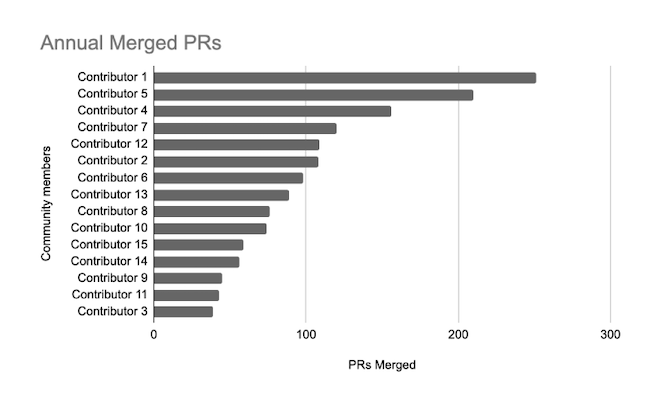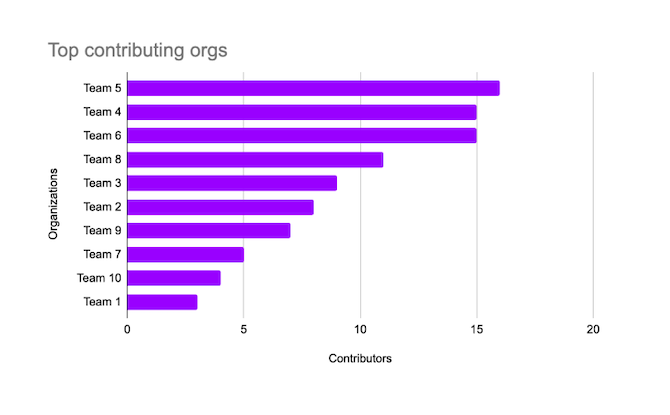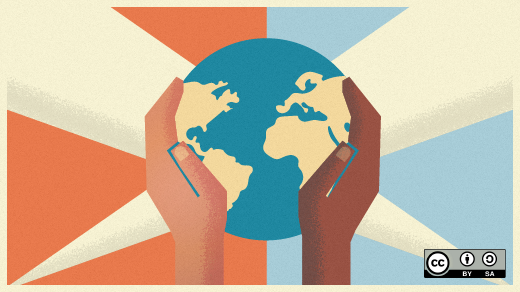7.4 KiB
How to make community recognition more inclusive
Look beyond metrics to ensure that all contributions are valued. When everyone feels like they have a home where they're appreciated, community members will be encouraged to stay engaged.
Giving recognition to someone for a job well done is one of my favorite duties as a community manager. Not only do I get to thank someone, but I also have a chance to highlight a role model for the rest of the community. Recognition also provides an opportunity to celebrate an achievement, like someone helping new community members with onboarding, reducing technical debt, or contributing an exciting new feature.
However, the methods used to identify contributions and recognize them can have unintended consequences. For example, sometimes community managers use charts like the following during recognitions, emphasizing pull requests (PRs) and contributions to code repositories.
 (Image by: Ray Paik, CC BY-SA 4.0)
(Image by: Ray Paik, CC BY-SA 4.0)
 (Image by: Ray Paik, CC BY-SA 4.0)
(Image by: Ray Paik, CC BY-SA 4.0)
Three problems arise with using these types of data for recognition. First, there's too much focus on contributions in code repositories. In the early days, open source projects attracted mostly developers, so naturally a lot of collaboration was done around code. Now, an increasing number of nondevelopers are participating in communities (for example, through user groups, meetups, user-generated content), and they will be doing most of their work outside repositories. Those contributions don't register on a chart like Annual Merged PRs.
Second, with too much focus on metrics (that is, things that can be measured quantitatively), you may end up rewarding quantity over quality—or even impact. In the Top Contributing Orgs chart above, larger organizations have a clear advantage over smaller organizations, as they have more people available. By recognizing larger organizations for their volume of work or contributions, you may inadvertently make people from smaller organizations feel disenfranchised.
Finally, even though it's not the intent, some people may view these data as a ranking of the importance of individual community members or organizations.
For all these reasons, it's best to avoid relying solely on metrics for community recognition.
Make recognition more meaningful
What are some more inclusive ways to approach community recognition and acknowledge a variety of contribution types? Communication channels like Discord, Internet Relay Chat (IRC), mailing lists, or Slack provide good clues as to which community members are active and what they're passionate about. For example, I'm always amazed to find members who are very generous in answering others' questions and helping newcomers. These contributions don't show up in community dashboards, but it's important to recognize this work and let everyone know that this contribution is valued.
Speaking of community dashboards, they're certainly important tools in open source communities. However, I caution against spending too much time building dashboards. Sooner or later, you will find that not everything is easily measurable, and even if you find a way to quantify something, it often lacks context.
One of the things I do to get more context around the contributions is to schedule coffee chats with community members. These conversations give me an opportunity to learn about why they decided to make the contribution, how much work was involved, others who were also involved, and so on.
When I talk to these members for the first time, I often hear that they feel it's important to find ways to give back to the community, and they're looking for ways to help. Some are even apologetic because they cannot contribute code, and I have to reassure them that code is no longer the only thing that matters in open source. Sometimes these conversations allow me to make connections among community members in the same city or industry, or to find other common interests. Fostering these connections helps strengthen a sense of belonging.
Make recognition more impactful
In addition to finding more activities to recognize, you can also present recognition in ways that have a bigger effect. For example, be timely with kudos when you see a good contribution. A quick DM with a simple thank you can be more effective than something more formal a month or two later. Many people, myself included, tend to stress over sending the right merchandise with recognition, but it's important to remember that swag is not the main motivator for community members' contributions. Recognizing good work and making an effort to reach out goes a long way in making people feel appreciated.
It's also a good idea to give members an opportunity to participate in the recognition process. Once a community reaches a certain size, it's difficult to know everything that's happening. Having a simple nomination form that community members can submit will raise awareness of good contributions that others may not have been aware of. If your community has formal awards for members—for example, awards presented at an annual conference or meetups—involve members in the nomination and voting process. This not only provides an opportunity for more people to participate in the process, but the awards will also be more meaningful to recipients since they come from their peers.
Finally, giving recognition is a vital opportunity to get to know community members and build relationships. Sometimes the recognition process can feel almost transactional: "You did X, so we're going to award you with Y." Taking the time to do personal outreach along with the award will make community members feel more appreciated and strengthen their sense of belonging.
Recognitions build community health
There's a lot of work to be done to improve diversity, inclusion, and belonging in open source communities. Better community recognitions play an essential role in these efforts. Ensuring that all contributions are valued and that everyone feels like they have a home where they're appreciated will encourage members to stay engaged in the community.
via: https://opensource.com/article/22/5/inclusive-community-recognition
作者:Ray Paik 选题:lkxed 译者:PeterPan0106 校对:校对者ID
